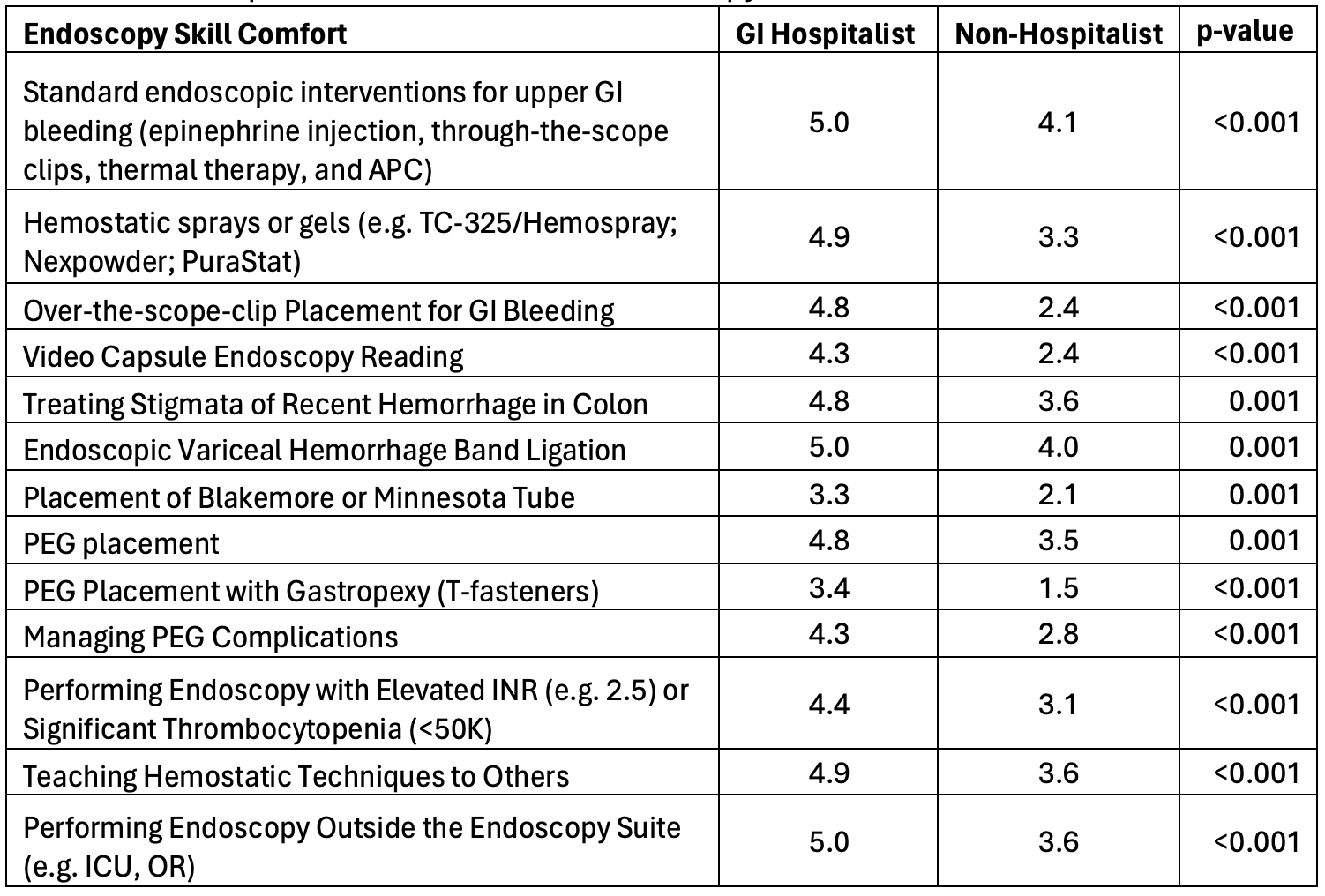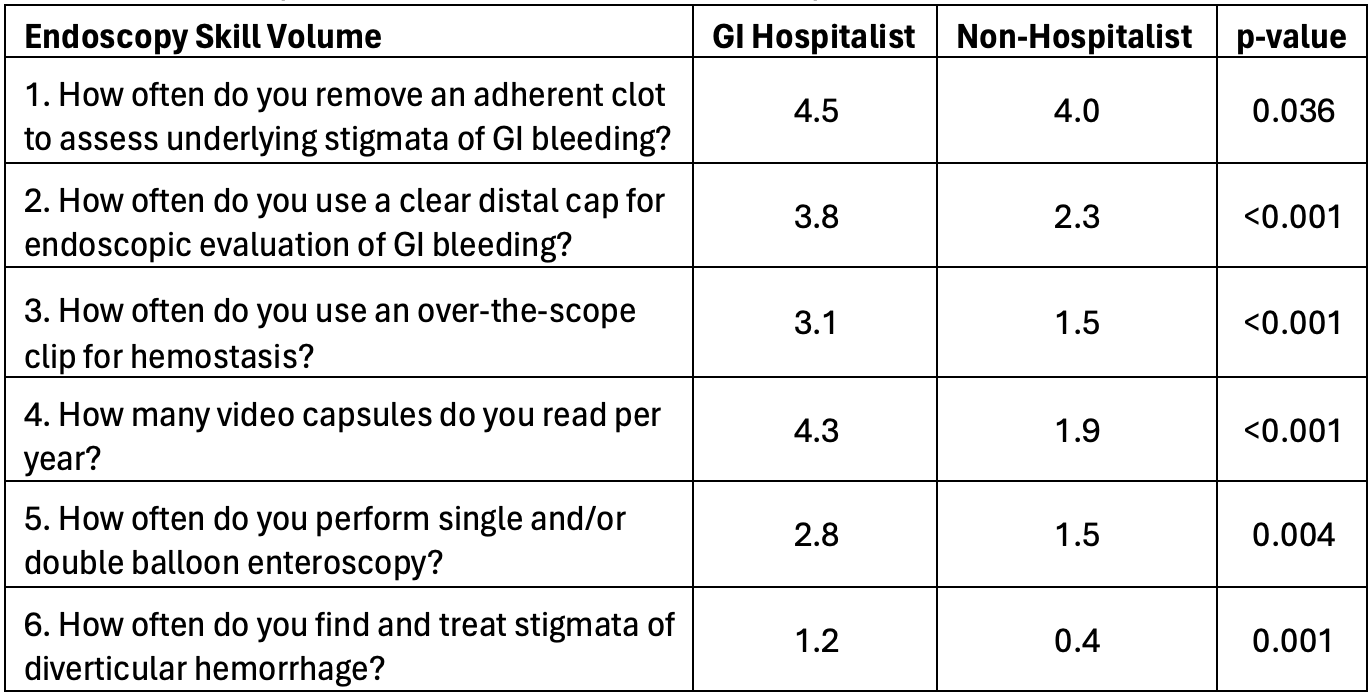Sunday Poster Session
Category: General Endoscopy
P0860 - Defining the Skillset of a GI Hospitalist: A Multicenter Survey of Gastroenterology Faculty Assessing Competence and Comfort With Endoscopic Skills
Sunday, October 26, 2025
3:30 PM - 7:00 PM PDT
Location: Exhibit Hall
- RF
Ryan Flanagan, MD, MPH
Brigham and Women's Hospital, Harvard Medical School
Boston, MA
Presenting Author(s)
Ryan Flanagan, MD, MPH1, Daniel Stein, MD, MPH1, Michelle L. Hughes, MD2, David Wan, MD3, Calley Levine, MD3
1Brigham and Women's Hospital, Harvard Medical School, Boston, MA; 2Yale School of Medicine, Orange, CT; 3NewYork-Presbyterian Hospital/Weill Cornell Medical Center, New York, NY
Introduction: Gastroenterology hospitalists (GIH) have become an integral component of academic inpatient gastroenterology services, providing unique expertise in endoscopic procedures for acutely ill patients. However, the competencies that distinguish GIH from non-GIH gastroenterologists are not well defined. Understanding these skill differences is crucial for determining optimal inpatient staffing models, enhancing faculty development, and improving gastroenterology fellowship training pathways.
Methods: We conducted a multicenter cross-sectional survey among faculty at six academic gastroenterology programs with both GIH and non-GIH. The survey measured self-assessed comfort and procedural volume with a range of endoscopic skills relevant to inpatient care, as well as clinical and call responsibilities. Comfort was rated on a 5-point Likert scale. Statistical comparisons between GIH and non-GIH, including a subgroup of advanced endoscopists, were performed using Student’s t-test and Fisher’s exact test (statistical significance: p < 0.05).
Results: Seventy-one faculty responded (response rate 31%), including 12 GIH and 59 non-GIH. GIH attended more weeks on inpatient service (≥10 weeks/year for all) and reported significantly greater comfort than non-GIH for every surveyed endoscopic skill (table 1). Notable differences were seen in comfort with advanced hemostasis techniques, over-the-scope clip placement, video capsule endoscopy, and PEG tube placement with gastropexy (all P < 0.001). GIH performed higher procedural volumes compared to non-GIH (table 2) and demonstrated comfort levels with endoscopic maneuvers comparable to advanced endoscopists, except for video capsule endoscopy, where GIH reported higher comfort (P = 0.02). There were no differences in overnight or weekend call coverage between groups. Many GIH acquired these endoscopic skills, despite training in fellowship programs without a GIH on staff.
Discussion: GI hospitalists represent a specialized, evolving group of gastroenterologists with broad endoscopic competencies that distinguish them from non-GIH colleagues, aligning closely with some skills typically attributed to advanced endoscopists despite lack of additional formalized training. These findings emphasize the need for formal recognition of this subspecialty and structured GIH training pathways. Integrating GIH as leaders in procedural education and faculty development efforts may improve staff satisfaction, patient care quality, and fellowship training.

Figure: Table 1. Endoscopist Comfort with Various Endoscopy Skills
Legend: Rating represents the mean response on a 5 point Likert scale (1, Not comfortable; 2, Slightly comfortable; 3, Comfortable; 4, Very comfortable; 5, Completely Comfortable)

Figure: Table 2. Endoscopist Volume with Various Endoscopic Maneuvers
Legend: Rating varies by question as noted below.
Question 1, 2: Mean response on a 5-point Likert scale (1, Never; 2, Rarely; 3, Sometimes; 4, Often; 5, Always)
Question 3: Mean response on a 5-point scale for number of times in the past 6 months (1, None; 2, 1-3 times; 3, 4-6 times; 4, 7-10 times; 5, 10+ times)
Question 4, 5: Mean response on a 6-point scale for number of times per year (1, None; 2, less than 5; 3, 6-10; 4, 11-15; 5, 16-20; 6, more than 20)
Question 6: Mean response on a 5-point scale for number of times within last two years (0, 0 times; 1, 1-3 times; 2, 4-6 times; 3, 7-10 times; 4, 10+ times)
Disclosures:
Ryan Flanagan indicated no relevant financial relationships.
Daniel Stein: Fujifilm endoscopy – Consultant. Ovesco endoscopy – Grant/Research Support.
Michelle Hughes: Iterative Health – Consultant.
David Wan: Medtronic – Consultant.
Calley Levine indicated no relevant financial relationships.
Ryan Flanagan, MD, MPH1, Daniel Stein, MD, MPH1, Michelle L. Hughes, MD2, David Wan, MD3, Calley Levine, MD3. P0860 - Defining the Skillset of a GI Hospitalist: A Multicenter Survey of Gastroenterology Faculty Assessing Competence and Comfort With Endoscopic Skills, ACG 2025 Annual Scientific Meeting Abstracts. Phoenix, AZ: American College of Gastroenterology.
1Brigham and Women's Hospital, Harvard Medical School, Boston, MA; 2Yale School of Medicine, Orange, CT; 3NewYork-Presbyterian Hospital/Weill Cornell Medical Center, New York, NY
Introduction: Gastroenterology hospitalists (GIH) have become an integral component of academic inpatient gastroenterology services, providing unique expertise in endoscopic procedures for acutely ill patients. However, the competencies that distinguish GIH from non-GIH gastroenterologists are not well defined. Understanding these skill differences is crucial for determining optimal inpatient staffing models, enhancing faculty development, and improving gastroenterology fellowship training pathways.
Methods: We conducted a multicenter cross-sectional survey among faculty at six academic gastroenterology programs with both GIH and non-GIH. The survey measured self-assessed comfort and procedural volume with a range of endoscopic skills relevant to inpatient care, as well as clinical and call responsibilities. Comfort was rated on a 5-point Likert scale. Statistical comparisons between GIH and non-GIH, including a subgroup of advanced endoscopists, were performed using Student’s t-test and Fisher’s exact test (statistical significance: p < 0.05).
Results: Seventy-one faculty responded (response rate 31%), including 12 GIH and 59 non-GIH. GIH attended more weeks on inpatient service (≥10 weeks/year for all) and reported significantly greater comfort than non-GIH for every surveyed endoscopic skill (table 1). Notable differences were seen in comfort with advanced hemostasis techniques, over-the-scope clip placement, video capsule endoscopy, and PEG tube placement with gastropexy (all P < 0.001). GIH performed higher procedural volumes compared to non-GIH (table 2) and demonstrated comfort levels with endoscopic maneuvers comparable to advanced endoscopists, except for video capsule endoscopy, where GIH reported higher comfort (P = 0.02). There were no differences in overnight or weekend call coverage between groups. Many GIH acquired these endoscopic skills, despite training in fellowship programs without a GIH on staff.
Discussion: GI hospitalists represent a specialized, evolving group of gastroenterologists with broad endoscopic competencies that distinguish them from non-GIH colleagues, aligning closely with some skills typically attributed to advanced endoscopists despite lack of additional formalized training. These findings emphasize the need for formal recognition of this subspecialty and structured GIH training pathways. Integrating GIH as leaders in procedural education and faculty development efforts may improve staff satisfaction, patient care quality, and fellowship training.

Figure: Table 1. Endoscopist Comfort with Various Endoscopy Skills
Legend: Rating represents the mean response on a 5 point Likert scale (1, Not comfortable; 2, Slightly comfortable; 3, Comfortable; 4, Very comfortable; 5, Completely Comfortable)

Figure: Table 2. Endoscopist Volume with Various Endoscopic Maneuvers
Legend: Rating varies by question as noted below.
Question 1, 2: Mean response on a 5-point Likert scale (1, Never; 2, Rarely; 3, Sometimes; 4, Often; 5, Always)
Question 3: Mean response on a 5-point scale for number of times in the past 6 months (1, None; 2, 1-3 times; 3, 4-6 times; 4, 7-10 times; 5, 10+ times)
Question 4, 5: Mean response on a 6-point scale for number of times per year (1, None; 2, less than 5; 3, 6-10; 4, 11-15; 5, 16-20; 6, more than 20)
Question 6: Mean response on a 5-point scale for number of times within last two years (0, 0 times; 1, 1-3 times; 2, 4-6 times; 3, 7-10 times; 4, 10+ times)
Disclosures:
Ryan Flanagan indicated no relevant financial relationships.
Daniel Stein: Fujifilm endoscopy – Consultant. Ovesco endoscopy – Grant/Research Support.
Michelle Hughes: Iterative Health – Consultant.
David Wan: Medtronic – Consultant.
Calley Levine indicated no relevant financial relationships.
Ryan Flanagan, MD, MPH1, Daniel Stein, MD, MPH1, Michelle L. Hughes, MD2, David Wan, MD3, Calley Levine, MD3. P0860 - Defining the Skillset of a GI Hospitalist: A Multicenter Survey of Gastroenterology Faculty Assessing Competence and Comfort With Endoscopic Skills, ACG 2025 Annual Scientific Meeting Abstracts. Phoenix, AZ: American College of Gastroenterology.

